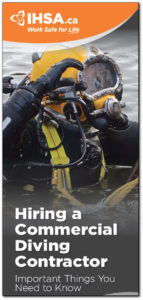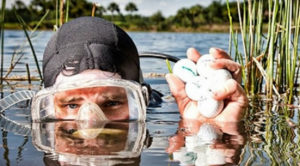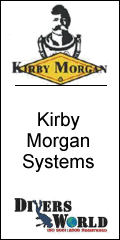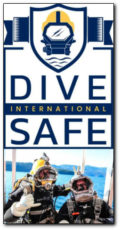UNDERWATER WORK – HOW A COTTAGE OR BOAT OR GOLF CLUB OWNER COULD GO TO JAIL FOR A BOTTLE OF BEER
By CADC Admin ~ May 30th, 2018. Filed under: EDUCATION, Latest Diving News, Law, Safety.
 (CADC Note: So, you have a cottage and need your water intake checked – or your dock checked – or find your fishing rod that you lost last fall. Or you may be a golf club owner with too many balls in the water hazards that you want to fish out. BUT heh!!! You have a buddy who took his recreational dive course this last winter – or took a course in the Bahamas – and he has offered to do it all for you for a case or bottle of beer – or a BBQ dinner – or something to “reward” him for his troubles. And he gets to try out his new dive skills!!! Awesome!! …….. Did you know you could go to jail if there is an accident of any kind? Giving anyone remuneration of ANY type for the supply of goods and services makes that person become a worker under the Labour Act. And because a worker is protected under the Act and YOU – as the “employer” – are now fully responsible for anything that happens if that worker is not protected and can face serious consequences including jail time ………………….. read on – this is not a myth!!! ED.) DOWNLOAD IHSA HIRING A COMMERCIAL DIVER
(CADC Note: So, you have a cottage and need your water intake checked – or your dock checked – or find your fishing rod that you lost last fall. Or you may be a golf club owner with too many balls in the water hazards that you want to fish out. BUT heh!!! You have a buddy who took his recreational dive course this last winter – or took a course in the Bahamas – and he has offered to do it all for you for a case or bottle of beer – or a BBQ dinner – or something to “reward” him for his troubles. And he gets to try out his new dive skills!!! Awesome!! …….. Did you know you could go to jail if there is an accident of any kind? Giving anyone remuneration of ANY type for the supply of goods and services makes that person become a worker under the Labour Act. And because a worker is protected under the Act and YOU – as the “employer” – are now fully responsible for anything that happens if that worker is not protected and can face serious consequences including jail time ………………….. read on – this is not a myth!!! ED.) DOWNLOAD IHSA HIRING A COMMERCIAL DIVER
(by Lois Gordon) Well, the usual season-opening chores are upon us now: water intakes need checking; docks get replaced or repaired; the boat gets overhauled and goes out for its inaugural run; the new boathouse is finally being built!
What all these water-based activities mean is that someone is probably going to have to get in the water to get the jobs done. There’ll be equipment to lift out, deadwood to be cleared away, lost machinery to recover, piles to secure – and a whole lot more.
Many lakeside property owners search around for a diver with SCUBA gear to do the underwater labour. On one hand, that’s a positive move, realizing that diving requires some level of skill and is best handled by a professional. On the other hand, though, most SCUBA divers are not professionals; they’re usually just people who took a PADI course so they could explore reefs in the Caribbean or sunken ships in Georgian Bay.
And that could spell trouble for you if you hire one.
Why?
First of all, diving is dangerous work. As a property owner, you need to protect the diver from all hazards and yourself from the risk of liability. The slightest mistake can have disastrous consequences, both for the diver and for the property owner, who may face financial and personal costs associated with contravening laws that govern health and safety.
DID YOU KNOW?
As soon as money or remuneration of any kind changes hands, your weekend job has just become a commercial diving operation, and recreational/sport divers are not permitted to perform commercial work.
According to Ontario diving regulations:
- Every person who participates in a diving operation must have completed the required DCBC (Diver Certification Board of Canada) official training certification;
- All divers must be certified in first aid, cardio-pulmonary resuscitation and oxygen administration;
- Dive operation and emergency plans must be completed.
Furthermore, the Ontario Ministry of Labour (MOL) must be notified of all dive operations. Upon a workplace inspection, MOL inspectors will be looking for those DCBC certificates.
A MISSION TO EDUCATE
The Commercial Diving Trade Labour-Management Health & Safety Committee (LMHSC), one of 22 construction trade committees that function under the Infrastructure Health & Safety Association (IHSA) Labour-Management network, is on a mission to educate. They want property owners to know about the perils of hiring non-professionals to carry out diving operations on lakes and rivers in cottage country, and in the aptly named water hazards on golf courses. This initiative is aimed at saving lives and protecting property owners from potentially serious consequences.
DOWNLOAD IHSA HIRING A COMMERCIAL DIVER
The LMHSC has started a campaign to reach out to cottagers and to recreational facilities such as golf courses, marinas, resorts and campgrounds in an effort to inform them that, as business and property owners, they can be held criminally responsible if an unqualified diving contractor is used – especially if something goes horribly wrong.
Richard Hayward, Diving Safety Specialist and Diving Supervisor with Ontario Power Generation, put it this way: “People have died, people will continue to die. There are unrecognized hazards in small jobs such as snow machine retrieval, water line repairs and golf ball retrieval. A person thinks they can strap a tank on their back and make a few extra bucks on the weekend. Air management is a big hazard. A person starts a job, it’s a little deeper than they planned, the water a little darker than they are used to, the job is a little tougher than assumed. A SCUBA (Self Contained Underwater Breathing Apparatus) cylinder only lasts so long. Add in those stressors and the air does not last nearly as long as they’re expecting. The person is focused on the job, not air management, and runs out of air. The possibility of entanglement, equipment failure or injury can all result in the diver running out of air before help can arrive and assist.”
 One big area of concern is golf ball salvage. It has been a lucrative sideline for recreational divers looking to make some extra cash; at a dollar a ball, money adds up fast. Says Hayward, “people do not realize that these ponds are extremely contaminated. The fertilizers and herbicides used for maintenance collects in these ponds – bacteria and fecal matter create a miasmic swamp. Toxins can enter your body through your skin, mouth and lungs. Decaying organic matter, once stirred up, can release gasses and make the air just above the water hazardous to breathe. You come to the surface, take your mask off, take your regulator out of your mouth, inhale and pass out and drown due to lack of oxygen from the gasses released by stirring up the bottom. People will continue to be injured and, at worst, killed.”
One big area of concern is golf ball salvage. It has been a lucrative sideline for recreational divers looking to make some extra cash; at a dollar a ball, money adds up fast. Says Hayward, “people do not realize that these ponds are extremely contaminated. The fertilizers and herbicides used for maintenance collects in these ponds – bacteria and fecal matter create a miasmic swamp. Toxins can enter your body through your skin, mouth and lungs. Decaying organic matter, once stirred up, can release gasses and make the air just above the water hazardous to breathe. You come to the surface, take your mask off, take your regulator out of your mouth, inhale and pass out and drown due to lack of oxygen from the gasses released by stirring up the bottom. People will continue to be injured and, at worst, killed.”
SERIOUS CONSEQUENCES MAY APPLY
Bill C-45 is federal legislation that amended the Canadian Criminal Code and established new legal duties for workplace health and safety, and imposed serious penalties for violations that result in injuries or death.
For example, in Ontario the penalties under the Occupational Health & Safety Act are:
- For individuals, up to $25,000.00 and/or up to 12 months’ imprisonment
- For Corporations, up to $500,000.00 per conviction
- Contraventions of the Criminal Code may result in imprisonment or fines in excess of $100,000.00
- You could be personally liable if an accident or an injury occurs and the contractor does not have WSIB coverage – this can include being held liable for medical and other costs
- In the event of serious injury, you could also be exposed to lawsuits.
You might think that hiring a contractor is expensive, and the truth is that you’re right. Current regulations require a 3-person team onsite; upcoming changes will see that become a 4-person team. A diver, a tender and a back-up diver/supervisor are required on all commercial diving jobs. That’s a lot of wages and a lot of overhead to pay for. But does it make it cost-prohibitive? Not if you look at the human costs if you try to duck the system.
By choosing a professional diving contractor, you will have peace of mind knowing that the job will be done safely and properly and that your investment will be protected.
SIDEBAR:
Before hiring a professional dive contractor, verify the following checklist items:
Step One – Ask about their business
- Only use an experienced and reputable contractor.
- Have the contractor provide you with a list of references.
- The contractor should provide a written contract that includes the scope of the work and terms of payment.
- Obtain a copy of the contractor’s WSIB Certificate, and make sure it’s current.
- Obtain a copy of the contractor’s work-related insurance certificate to ensure that risks are covered.
Step Two – Ask about health and safety
- Contractors are legally required to have a health and safety policy and program.
- Obtain written assurance from the contractor that they will comply with the legislation that governs the work.
- The contractor must assign a competent supervisor to the site.
- The contractor should provide a contact name and the name of the supervisor that will be at the work site. It’s important for you to have someone in a position of authority that you can talk to if needed.
- On a dive site, all workers must be competent for their duty and must provide proof of training from the Diver Certification Board of Canada (DCBC).
Step 3 – Protect Yourself
Ensure the contractor gives you a written contract that includes the specific work to be performed, terms of payment, and warranties or guarantees. If contractors do not provide you with a written contract, you shouldn’t hire them.
For a complete guideline checklist for compliance to CSA Z275.2-15 please visit CADC.ca :
DOWNLOAD IHSA HIRING A COMMERCIAL DIVER







